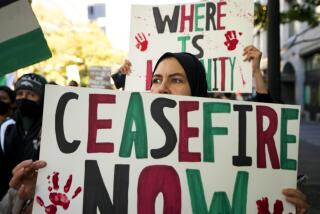Democracy’s Bus Is Rolling in Iraq
Iraq is starting to resemble the 1994 movie “Speed.” Like the bus on which Sandra Bullock and company were trapped, the country is in constant danger of blowing up. To avoid disaster, it has to keep moving, crashing through some obstacles and avoiding others. As long as it maintains momentum, its occupants will survive.
Too many real bombs have been blowing up in Iraq recently. But as horrifying as their consequences are, the political bombs that haven’t blown up are even more significant.
There has been a danger of outright civil war erupting among Sunnis intent on regaining their old privileges, Shiites bent on holding early elections that would give them governmental control and Kurds determined to maintain their autonomy. L. Paul Bremer III has been playing the Keanu Reeves role, trying to keep the bus in one piece.
Bremer’s efforts were rewarded this week when the 25-member Iraqi Governing Council agreed on an interim constitution that is a marvel of liberalism. It guarantees free speech, free religion, free assembly and numerous other rights that are taken for granted in the West but are conspicuously absent in the Arab world. Despite an attempt by some clerics to impose Islamic dictates, the constitution says only that Sharia will be one source among many for Iraqi law. Sure, the document leaves important issues unresolved, such as the future role of political militias, but it’s pretty impressive that agreement was reached at all by a fractious group of Iraqis.
The biggest outstanding issue is how to select an interim government after the formal U.S. occupation ends June 30. Bremer pushed for caucuses; Grand Ayatollah Ali Sistani, the leader of Iraq’s Shiites, insisted on elections. In a development reminiscent of Winston Churchill’s famous quip about battleship procurement (“The admiralty asked for six ships, the government offered four, so they compromised on eight”), they seem to be heading for neither elections nor caucuses. Though the exact mechanism remains undetermined, power is likely to pass on June 30 to an unelected provisional government, probably an expanded Governing Council, which will prepare for elections by Jan. 30.
Sistani deserves kudos for abandoning his earlier insistence on immediate nationwide balloting, which would have been unworkable. The ayatollah’s willingness to compromise suggests a keen awareness of his adopted country’s troubled history.
In 1920, Iraqi Shiites led a bloody rebellion against British rule. The British, eager to pull out, handed over authority to Sunnis led by a Hashemite royal family imported from Hijaz. The Shiites were frozen out of power for the next eight decades. Sistani doesn’t want to repeat that mistake by forcing out coalition troops prematurely or making Iraq ungovernable. Thus he was willing to back down after U.N. envoy Lakhdar Brahimi agreed that elections couldn’t be held right away.
There is more good news coming from Iraq. Thanks in part to the much-maligned work of Halliburton, the country’s oil production and electricity generation will soon surpass prewar levels. The number of coalition soldiers killed in January and February (75) was 52% lower than in November and December (158). The number of U.S. soldiers wounded fell even more during that period -- to 260 from 638.
Of course, the glad tidings shouldn’t be exaggerated. One reason why attacks on coalition soldiers are down is that, as Tuesday’s atrocities in Baghdad and Karbala demonstrate, terrorists are finding Iraqis an easier target. But although the terrorists can kill and maim, they cannot win public support. In the Sunni Triangle, where most of the violence is occurring, 21 imams issued a fatwa condemning “any act of violence against Iraqi state government workers, police and soldiers.”
As responsibility for fighting insurgents and criminals falls more squarely on Iraqi shoulders, the number of foreign casualties should decline still further. Coalition troops won’t be able to leave Iraq for years, but they will be able to concentrate their efforts outside major cities, where they will be less vulnerable to attack. Having Iraqis, not Americans, patrol city streets should also remove some of the resentments fostered by foreign occupation.
More bombs, both real and metaphorical, are certain to go off in the days ahead, but Iraq already has confounded many Western “progressives” who doubted that the Arab world could ever make progress. The bus may be rickety and it may have lost some passengers, but -- guess what? -- it’s on schedule toward its final destination: democracy.
Max Boot, a senior fellow at the Council on Foreign Relations, writes a weekly column for the Los Angeles Times.
More to Read
Sign up for Essential California
The most important California stories and recommendations in your inbox every morning.
You may occasionally receive promotional content from the Los Angeles Times.









